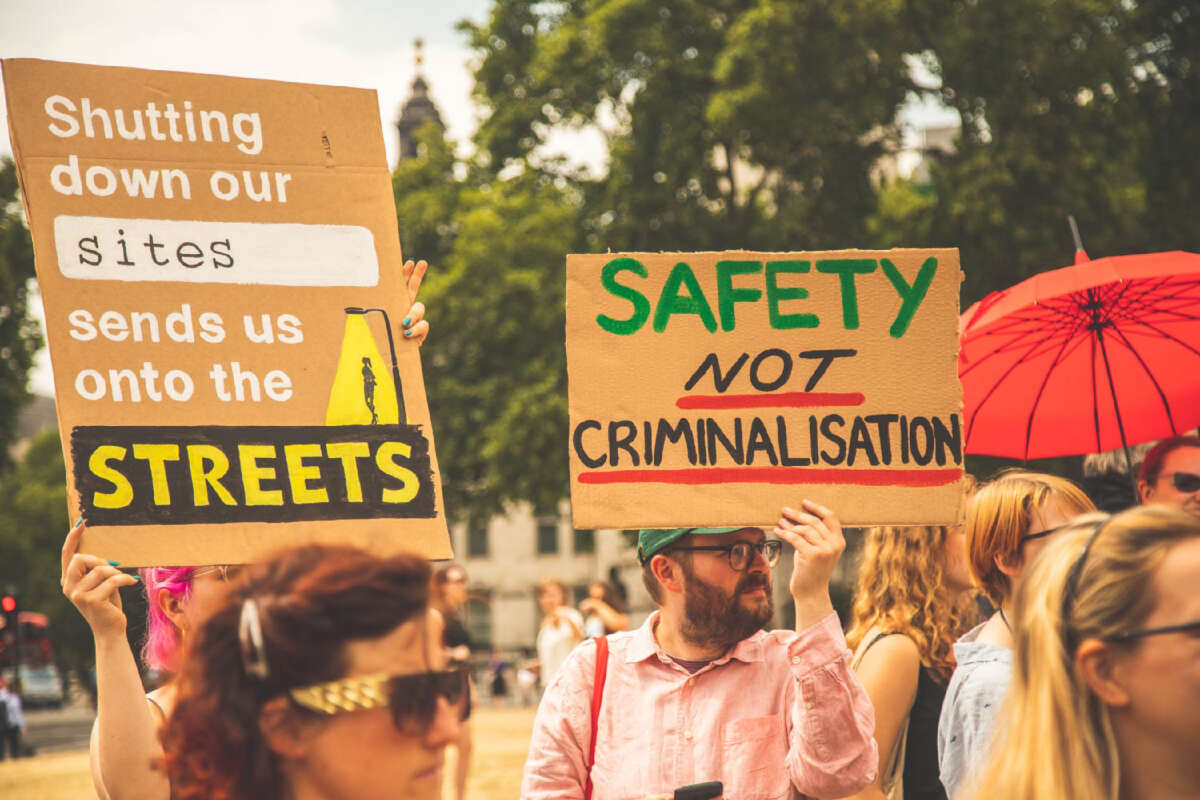Honest, paywall-free news is rare. Please support our boldly independent journalism with a donation of any size.
The D.C. Circuit Court of Appeals ruled on Friday that the Fight Online Sex Trafficking Act (FOSTA) is constitutional, upholding key portions of the law that critics have said intrudes on First Amendment speech protections and harms sex workers.
“Today in necropolitical news, FOSTA is upheld. Our government, courts, and all its agencies don’t read or care about reliable science or listen to stakeholders directly harmed by their toxic policies,” Angela Jones, a sociologist and sex worker scholar, said on Twitter in response to the ruling.
FOSTA suspends Section 230 of the Communications Decency Act of 1996, a law that grants online platforms protection from liability for user-generated speech. After FOSTA passed, social media platforms were forced to censor sex-worker generated content in fear of being held criminally liable under the law.
Since becoming law five years ago, FOSTA has been condemned for making sex work more dangerous and increasing online censorship. While lawmakers passed the law to combat sex trafficking, critics have alleged that the law has hindered law enforcement from using websites to catch actual traffickers, and that sex trafficking reports actually tripled the year after FOSTA was enacted.
Hacking//Hustling, a collective of sex workers, sex trafficking survivors and allies who have researched the effects of FOSTA and its companion law, the Stop Enabling Sex Traffickers Act (SESTA), found in a poll that sex workers “suggested that this law represents a moralistic fight against sex work in general,” and that it is “making the sex work industry more dangerous.” More than 70 percent of respondents said that FOSTA-SESTA had negatively affected their financial situation.
“FOSTA has had terrible consequences for sex workers, kinksters, and LGBTQ folks on the internet,” Chelsea Julian Reynolds, communications professor at California State University, Fullerton, told Truthout. “Although FOSTA was signed into law as an anti-sex trafficking bill with widespread bipartisan support, resulting crackdowns on adult content have prevented sex workers from screening their clients and accessing their online banking services…This is very dangerous.”
In 2018, the Woodhull Freedom Foundation (WFF), the Human Rights Watch, the operators of the Internet Archive, and a massage therapist who alleged that he lost business when Craigslist pulled ads in response to the enactment of the law, sued to block enforcement of FOSTA. The lawsuit alleged that the law chilled constitutionally-protected speech and “erroneously conflates all sex work with trafficking.”
“In the hours after its passage, we saw the dramatic chilling effect FOSTA would have on legally protected speech, as platforms, forums and resources used sex workers and others were taken offline,” Ricci Joy Levy, President and CEO of the Woodhull Freedom Foundation, said in a statement. “In the years since, through both the data and lived experiences, we’ve seen how FOSTA has endangered the lives of sex workers. With this law, the government has encouraged censorship that is otherwise prohibited by the First Amendment.”
The lawsuit challenging FOSTA was dismissed by the district court on March 29, 2022. The plaintiffs appealed the lower court’s decision in September.
The D.C. Circuit Court of Appeals ruling dismissed concerns that the law was unconstitutionally vague and held that it did not violate free speech rights. However, the Court emphasized that the law must be interpreted narrowly and that “the intent to engage in general advocacy about prostitution, or to give advice to sex workers generally to protect them from abuse” would not legally be able to be criminalized or censored under this law.
“Although the Court did not issue the constitutional ruling we sought, it held that the law must be interpreted narrowly in order to avoid ‘grave constitutional questions,’” WFF said in a statement. “By imposing the interpretive discipline Congress lacked, the Court ruled out many of the broader applications of FOSTA that caused us to challenge it.”
Sex worker advocates have called for a total decriminalization of sex work in response to the ruling.
“Until sex work is decriminalized, laws like FOSTA will continue to dehumanize sex workers and push illegal activity, including child sex trafficking, into the shadows,” Reynolds said. “FOSTA doesn’t prevent human trafficking. It just moves it onto the dark web and into established criminal networks.”
A terrifying moment. We appeal for your support.
In the last weeks, we have witnessed an authoritarian assault on communities in Minnesota and across the nation.
The need for truthful, grassroots reporting is urgent at this cataclysmic historical moment. Yet, Trump-aligned billionaires and other allies have taken over many legacy media outlets — the culmination of a decades-long campaign to place control of the narrative into the hands of the political right.
We refuse to let Trump’s blatant propaganda machine go unchecked. Untethered to corporate ownership or advertisers, Truthout remains fearless in our reporting and our determination to use journalism as a tool for justice.
But we need your help just to fund our basic expenses. Over 80 percent of Truthout’s funding comes from small individual donations from our community of readers, and over a third of our total budget is supported by recurring monthly donors.
Truthout’s fundraiser ends tonight! We have a goal to add 122 new monthly donors before midnight. Whether you can make a small monthly donation or a larger one-time gift, Truthout only works with your support.
